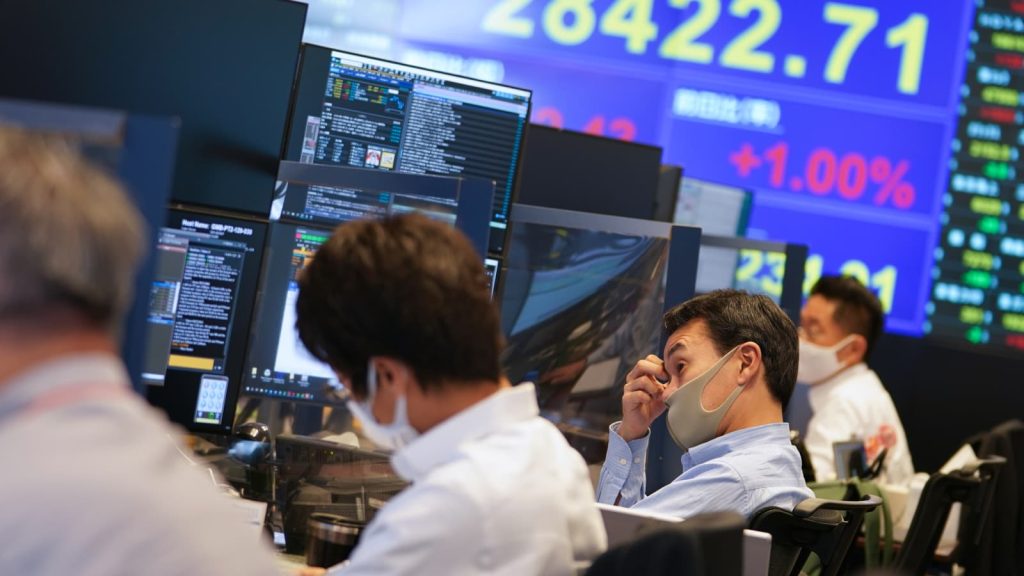
SINGAPORE — Chinese stocks fell in afternoon trading on Monday, while investors monitored bitcoin prices after they dropped sharply over the weekend. Oil prices jumped during Asia trade.
Hong Kong’s Hang Seng index tumbled about 1.76% to close at 23,349.38, as tech stocks fell. JD dropped 4.85% and Tencent was down 3.2%.
Alibaba shares in Hong Kong fell nearly 8% in early trade, but later recovered slightly to close down 5.61%. The company announced Toby Xu, its deputy chief financial officer, will succeed Maggie Wu as chief financial officer. That change will be effective Apr. 1.
That followed Friday’s losses in shares of Chinese firms listed in the U.S., as they dropped on concerns about stricter regulatory scrutiny after Didi announced it would delist from the New York Stock Exchange.
Four new stocks — including Chinese technology giants JD and Netease — were added to the benchmark Hang Seng index. The latest update increases the number of stocks in the main index to 64, from the current 60 stocks.
At the same time, troubled Chinese property developer Evergrande will be removed from the China Enterprises index.
Evergrande, embroiled in debt problems, warned Friday in a filing with the Hong Kong exchange that it has received a demand to repay about $260 million.
“In the event that the Group is unable to meet its guarantee obligations or certain other financial obligations, it may lead to creditors demanding acceleration of repayment,” it said.
After meeting the last few interest payments at the eleventh hour, the firm faces another grace period deadline on debt payments of $82.5 million, according to Reuters.
Evergrande shares plunged nearly 20% on Monday.
Mainland Chinese stocks also fell after rising earlier. The Shanghai composite closed down 0.5% to 3,589.31 while the Shenzhen component dipped nearly 1% to 14,752.96.
Other Asia-Pacific markets mixed
Japan’s Nikkei 225 pared earlier losses, falling 0.36% to close at 27,927.37, while the Topix was down 0.53% to 1,947.54. South Korea’s Kospi was up 0.17% to close at 2,973.25, turning around from a decline of 1% earlier.
Australia’s S&P/ASX 200 closed near the flatline to 7,245.10, also recovering from slight losses earlier.
MSCI’s broadest index of Asia-Pacific shares outside Japan dipped 0.83%.
Stocks across the region and globally have seen turbulent trading since last week on fears surrounding the new omicron variant.
“This week would be crucial as we would likely get a better read of the Omicron’s severity,” DBS wrote in a Monday note. “During the Delta variant surge in August, tech stocks held up better. That did not happen this time, with the Nasdaq correcting more than the S&P 500 or the Dow Jones index.”
“The mix of Omicron fears, upcoming tighter Fed policy and weak equities sentiment is proving difficult to digest, sparking demand for safety in longer-term US Treasuries,” it added.
Bitcoin volatility
Investors will continue to monitor crypto after bitcoin prices were volatile throughout the weekend, dropping sharply Saturday afternoon during Asia hours. Bitcoin initially lost about 17%, or $10,000 — falling to a low near $43,000.
Bitcoin was at $48,803 as of Monday afternoon during Asia hours. Still, the cryptocurrency has lost over 10% since Friday.
The U.S. dollar index, which tracks the greenback against a basket of its peers, was at 96.344, rising sharply from levels around 96.1 in previous days.
The Japanese yen traded at 113.10 per dollar, weakening slightly. The Australian dollar was at $0.7016, edging higher from levels around $0.69 earlier.
Oil prices jump
Oil prices climbed around 2% in early Asia trading hours after mostly falling last week on Covid uncertainty and the OPEC+ plan to increase output in January.
Brent futures were up 2% to $71.27 per barrel, while U.S. West Texas Intermediate crude rose 2.13% to $67.7 per barrel.
